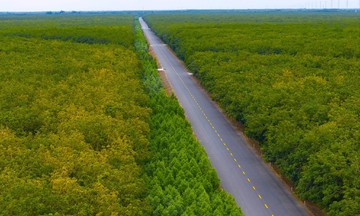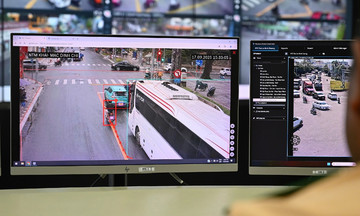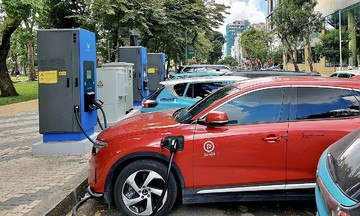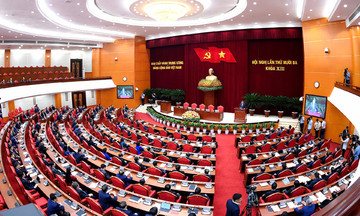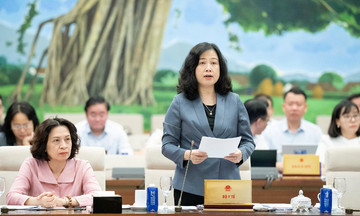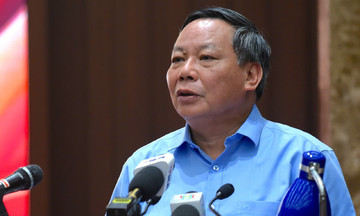Professor Hoang Xuan Han was born in 1908 into a family with a Confucian scholarly tradition in Duc Nhan commune, Duc Tho district, now Duc Quang commune. In his childhood, he studied Han characters and the national language in Vinh (Nghe An), then moved to Hanoi to take the entrance exam for Buoi School. A year later, he transferred to major in mathematics at the Albert Sarraut High School. In 1929, after passing the baccalaureate exam, he went to France to study, where he was admitted to prestigious schools: the Ecole Normale Superieure, Ecole Polytechnique, and the Sorbonne.
In 1936, at the age of 28, he returned to Vietnam with two degrees: a civil engineering degree and a master's degree in mathematics. The French government invited him to be the Director of Public Works, but he refused because the condition was to acquire French citizenship. He chose to teach at Buoi School to "be Vietnamese and train Vietnamese youth".
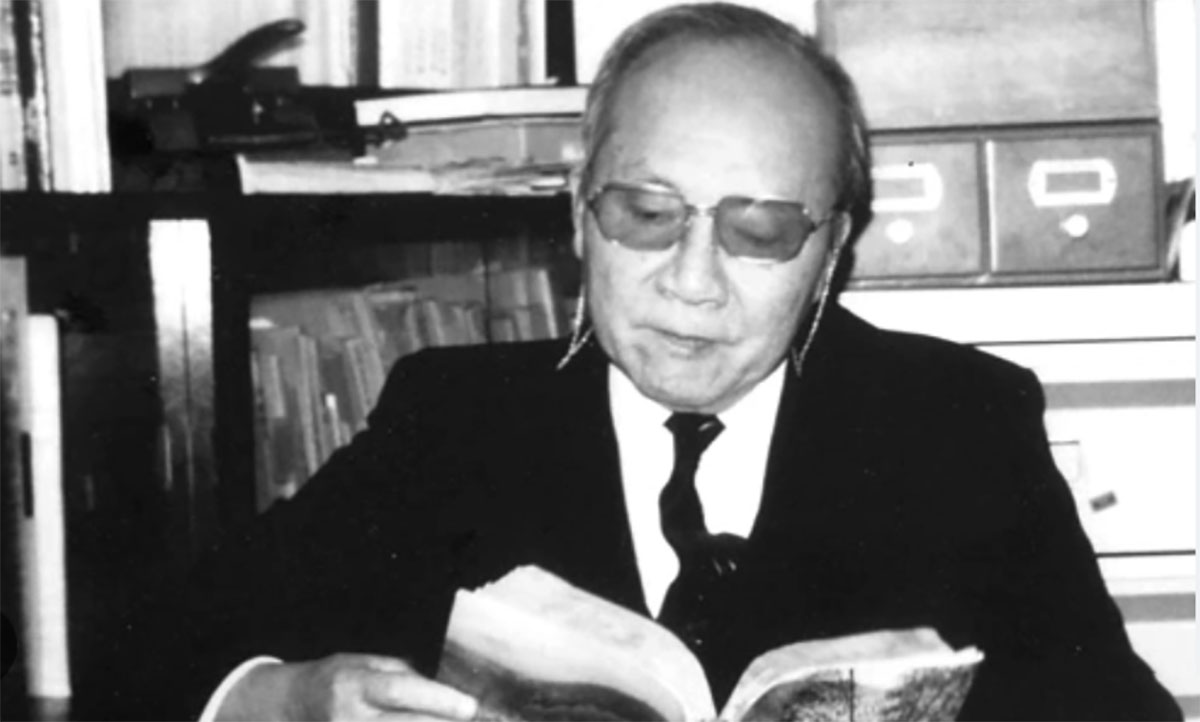 |
Professor Hoang Xuan Han. Photo: Archive |
Professor Hoang Xuan Han. Photo: Archive
The teacher who inspired critical thinking
Teaching mathematics at the high school baccalaureate level, he wrote his own curriculum, focusing on developing students' reasoning and intelligence. He often went to class without any tools. Empty-handed, he drew "perfectly straight lines and perfect circles, not requiring separate notebooks for each sub-subject".
Having studied in France for a long time and taught at Buoi School with Professor Hoang Xuan Han, Professor Nguyen Manh Tuong said that despite his vast knowledge, Professor Han was a virtuous and humble teacher. "He was willing to help anyone in difficulty, always smiling, even when someone displeased him," Professor Tuong wrote in an article published in the book *La Son Yen Ho Hoang Xuan Han*.
In class, he gently advised, never scolding students when they couldn't find a solution or were struggling with a difficult problem. "Professor Hoang Xuan Han's calm demeanor had a persuasive effect on his students, and he seemed to leave no one upset," Professor Tuong recounted.
In addition to teaching at Buoi School, Professor Hoang Xuan Han was also invited to teach mathematics at the University of Public Works, the School of Agriculture, and Hanoi University. In 1942, he and some friends, including Professor Nguyen Xien and Ta Quang Buu, founded the journal *Science*, a relatively high-level scientific publication. Professor Han was an editor and author, often solving puzzles related to practical life, astronomy, geography, history, and culture of the East and Vietnam.
In 1943, he began compiling the book *Scientific Terminology* with over 6,000 entries, using Vietnamese to express a series of scientific concepts in mathematics, physics, chemistry, mechanics, and astronomy, which had few Vietnamese terms at the time. In 1943, the book received an award from the Southern Vietnam Educational Encouragement Society for its significance in paving the way for building scientific concepts and terminology in Vietnam.
Referring to the founding of the journal and the compilation of the science book, Professor Hoang Xuan Han shared in his memoirs that while studying in Vinh or Hanoi, he "realized early on that without a minimum understanding of science, people couldn't have accurate and serious reasoning". Therefore, in 1930, while studying in France, he began thinking about establishing scientific terminology for a rational and national foundation.
Also in 1943, when the National Language Promotion Association was established, Professor Hoang Xuan Han served as Head of the Editorial Board and, along with others, published the book *Method of Learning the National Language*, innovating the way of learning the national language by spelling, helping learners grasp the language quickly.
When the "Eliminate Illiteracy" movement launched by President Ho Chi Minh gained nationwide support, Professor Hoang Xuan Han's method of learning the national language became the dominant approach, helping millions of people escape illiteracy in just three to six months.
In 4/1945, Professor Hoang Xuan Han joined the Tran Trong Kim interim government, serving as Minister of Education and Fine Arts and acting Minister of Public Works. During more than four months of work, he proposed and implemented several reforms, initially suggesting ideas for later educational reforms such as the high school curriculum with specialization at the upper secondary level and switching from teaching in French to Vietnamese (the 1945 baccalaureate exam was the first to be conducted in Vietnamese).
After the August Revolution, he and other prominent intellectuals were invited to meet President Ho Chi Minh. In 4/1946, he was appointed Head of the Political Subcommittee in the delegation of the Democratic Republic of Vietnam at the Franco-Vietnamese Conference in Da Lat (Lam Dong province). After the conference, he stayed to teach military engineering for the first training courses at the Tran Quoc Tuan Military Academy.
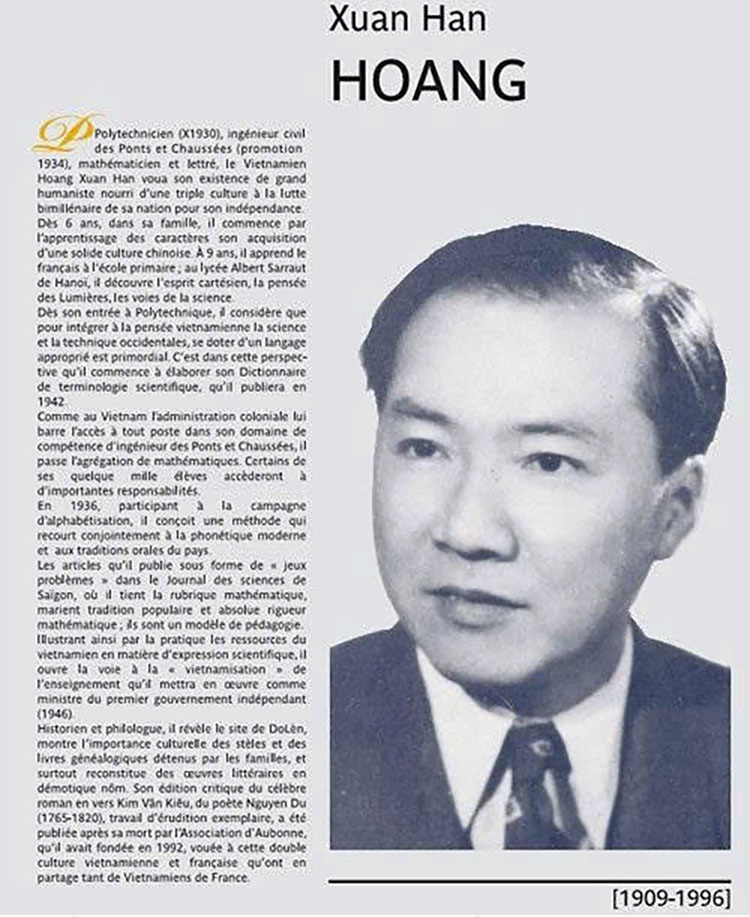 |
Professor Hoang Xuan Han's biography is displayed in front of the foreign language classroom of the Paris School of Bridges and Roads (Ponts et Chaussees). He was honored as one of the top 100 students, and a lecture hall at the university is named after him. Photo: Archive |
Professor Hoang Xuan Han's biography is displayed in front of the foreign language classroom of the Paris School of Bridges and Roads (Ponts et Chaussees). He was honored as one of the top 100 students, and a lecture hall at the university is named after him. Photo: Archive
A polymath scholar
When the nationwide resistance war broke out, Professor Hoang Xuan Han was "stuck" in Hanoi. During this time, his family's house became an inner-city base, secretly communicating with the resistance and providing financial and medical support. In 1950, he and his family moved to Paris.
He attended the 1954 Geneva Conference during the meetings held in Switzerland, contributing ideas to the Vietnamese delegation led by Deputy Prime Minister Pham Van Dong. He later participated in organizing patriotic overseas Vietnamese in France, promoting the nation's resistance against French colonialism and American imperialism, as well as the world peace movement.
Professor Hoang Xuan Han actively researched cultural and scientific works, delving into the field of atomic energy and obtaining a degree in nuclear engineering from the University of Saclay.
He spent many years studying history and Vietnamese history (published in the *Social Sciences Journal* in 1982), applying mathematics and computers to reconstruct the Vietnamese calendar system, proving that there were periods in Vietnamese history that differed from the Chinese calendar, and proposing accurate and convenient methods for converting between the lunar and solar calendars. This was an important work on astronomy in Vietnam, laying the scientific foundation for building the Vietnamese calendar system.
The professor researched and discovered many valuable relics and artifacts, suggesting locations where they had previously been found, based on which the Institute of Archaeology discovered several sites. For example, in 1942, during a field trip in the Len River region (Thanh Hoa), he discovered traces of ancient foundations in the "armchair" area of Kim Au mountain, identifying it as Bao Thanh Palace (Ly Palace of the Tran-Ho dynasty) associated with Ho Quy Ly in the 14th century.
Later excavations revealed the foundations and many important artifacts. In 1997, the Ly Palace of the Tran-Ho dynasty was recognized as a national historical and cultural relic and is currently a nearby attraction of the Ho Dynasty Citadel World Cultural Heritage site.
Many of his historical and literary works demonstrate patriotism and support for the nation's resistance wars, marking important milestones in research methods, collection, and processing of materials, such as: *Ly Thuong Kiet* (1949), *Mai Dinh Mong Ky* (1951), *La Son Phu Tu* (1952), *Chinh Phu Ngam Bi Khao* (1953), etc.
In the preface to the book *Ly Thuong Kiet - History of Diplomacy and Religion of the Ly Dynasty* - a representative work on a period of Dai Viet's resistance against the Song dynasty, republished in 2015, Professor Hoang Xuan Han wrote: "I hope everyone sees that the courage and indomitable spirit of our nation today have very distant roots. I hope everyone clearly and specifically recognizes the danger of a foreign invasion, recognizes that caring for the country is not just lip service but requires wholehearted sacrifice".
As a colleague and fellow countryman, Professor and historian Phan Huy Le described Hoang Xuan Han as "very Nghe Tinh, simple, emotional, and intellectual". Once, Professor Le asked Professor Han: "You are a mathematician, a nuclear physicist, a civil engineer, but why are you so passionate about and dedicate most of your life to studying national history and culture?".
Professor Han replied: "After returning from France to teach, I read Vietnamese history, and while I respect the authors, I felt that the research and compilation methods needed to be improved, to be more scientific and modern". For that reason, he embarked on historical research with the ambition to promote the development of historiography, helping readers feel confident and draw scientifically persuasive conclusions.
"Professor Han's research has had a profound influence on Vietnamese historians, especially in terms of spirit and research methods," Professor Le wrote.
Deep affection for his homeland
Having met Professor Hoang Xuan Han several times, Associate Professor of Mathematics Hoang Ky, Vinh University, said that he was a truly and deeply patriotic person. Once, a visitor asked Professor Han where he was from, he replied coldly: "My hometown is Vietnam!".
When he heard about the hardships during the war and the shortages during peacetime of teachers and students in Duc Tho district (Ha Tinh province) - where Professor Han was born, he was deeply moved and then sat in contemplation. "Professor Han was very interested in the current state of Vinh Pedagogical University, asking in detail about the faculties, the number of teachers and students, the quality of training, the advantages and disadvantages... promising to help the university," Associate Professor Ky said.
Professor of Agricultural Science Tran Van Ha recounted that during a meeting with Professor Hoang Xuan Han in 1992 at his private residence in apartment number 60, Theophile-Gauthier Boulevard, 16th arrondissement, Paris, the first question the senior scholar asked stunned him: "Are there still trees on Hong Linh mountain? What does Vietnam start with now, and how does it rise?".
According to Mr. Ha, Professor Han analyzed that Vietnam must develop through agriculture, paying more attention to mountainous and coastal areas, and exploitation must definitely have a protection plan. Once food security is stable, it is necessary to develop cattle, goat, and pig farming in both the northern and southern mountainous regions and promote the processing industry. It is necessary to think about industrializing cage fish farming, cooperating with Japan in black pearl farming, etc.
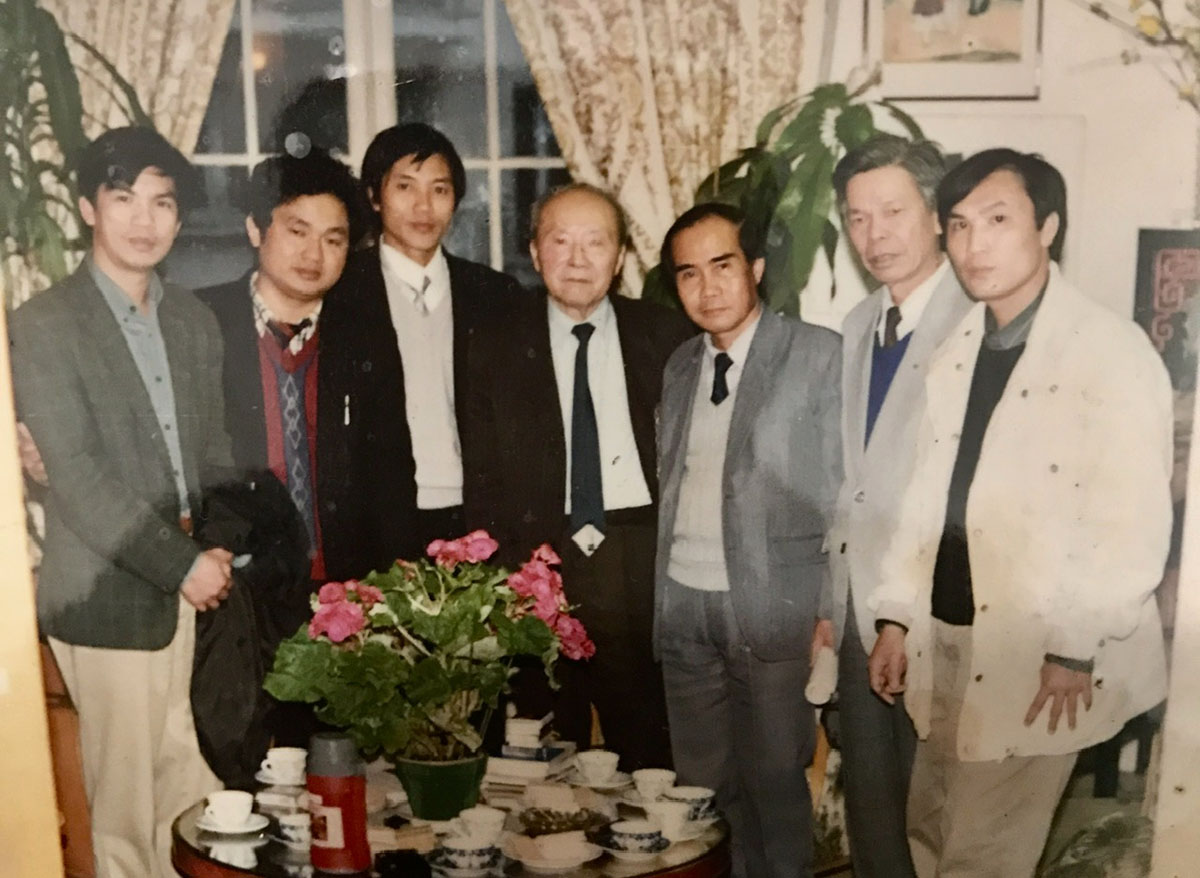 |
Dr. Vo Hong Hai (far right) with the Ha Tinh provincial delegation took a souvenir photo at Professor Hoang Xuan Han's house (the man in the black suit standing in the middle) in Paris, 3/1995. Photo: Vo Hong Hai |
Dr. Vo Hong Hai (far right) with the Ha Tinh provincial delegation took a souvenir photo at Professor Hoang Xuan Han's house (the man in the black suit standing in the middle) in Paris, 3/1995. Photo: Vo Hong Hai
Dr. Vo Hong Hai, former Head of the Ha Tinh Provincial Party Committee's Organization Department, recounted that Professor Han was eager to build a library for Ha Tinh and donate a cabinet of Han Nom documents, but due to the difficult economic conditions at the time, it could not be transported back. When Professor Han and his family moved to France, there were many negative comments, but over time it has been shown that his departure was to make a more sustainable contribution to the country's academic culture.
Professor Hoang Xuan Han passed away in 1996. According to his will, his family cremated his remains, part of which were kept at Truc Lam Pagoda on the outskirts of Paris, part scattered on French soil, and the rest buried in his hometown. On the gate and tomb are the parallel sentences: "Body entrusted to a foreign land, taking refuge in Buddha's door / Soul returns to Vietnamese soil, visiting the homeland".
Posthumously, in 1996, Professor Hoang Xuan Han was awarded the second-class Independence Order by President Le Duc Anh. In 2000, for a group of three research works on Vietnamese history and calendar, he was awarded the Ho Chi Minh Prize by the State. Many streets and schools are named after him.
Duc Hung
References:
: *La Son Yen Ho Hoang Xuan Han* volumes 1, 2, 3, Education Publishing House
: *Famous People of Ha Tinh* volumes 1, 2, Nghe An Publishing House





